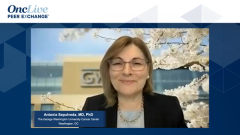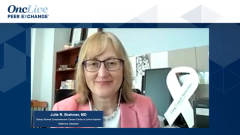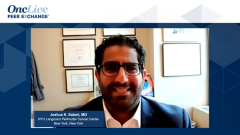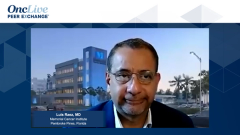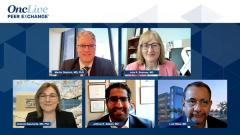
Biomarker Testing in Non-Small Cell Lung Cancer
A panel of experts on the treatment of non–small cell lung cancer (NSCLC) discuss the role of biomarker testing and review testing strategies.
Episodes in this series

Transcript:
Martin Dietrich, MD, PhD: Hello, and welcome to this OncLive Peer Exchange® titled “Advances in Biomarker Testing and Targeted Therapies in Non–Small Cell Lung Cancer.” I’m Martin Dietrich, a medical oncologist and assistant professor of internal medicine at the University of Central Florida Cancer Center. I’m joined today by a panel of experts in the field of lung cancer. I would like to welcome my fellow panelists to introduce themselves. Dr Brahmer?
Julie R. Brahmer, MD, MSc: Hello, I’m Dr Julie Brahmer. I’m the director of thoracic oncology at the Johns Hopkins Kimmel Cancer Center.
Martin Dietrich, MD, PhD: Dr Sepulveda?
Antonia Sepulveda, MD, PhD: Good afternoon, everyone. My name is Antonia Sepulveda. I am a professor and chair of the department of pathology at George Washington University in Washington, DC. I’m also the medical director for the laboratory at George Washington Hospital and medical director of the division of molecular and genomic pathology here at GW.
Joshua K. Sabari, MD: Hi, I’m Joshua Sabari. I’m a thoracic medical oncologist at NYU Langone Health's Perlmutter Cancer Center in New York.
Martin Dietrich, MD, PhD: And last but not least, Dr Raez.
Luis Raez, MD: Hi, my name is Luis Raez. I am the chief scientific officer and medical director of Memorial Cancer Institute and research professor at Florida Atlantic University in Florida.
Martin Dietrich, MD, PhD: Welcome everyone, and thank you for joining us today. Today, we’re going to discuss recent advances in biomarker testing in non–small lung cancer and updates to therapies that target key molecular pathways. We’ll be discussing the data in the context of other advances in the treatment landscape and their impact on clinical practice. Let’s get started on our first topic.
Obviously, we’re all aware biomarker testing is critical for non–small cell lung cancer testing. We have currently at least 9 approved biomarkers by the FDA that should be tested for every patient with locally advanced or metastatic non–small cell lung cancer in the clinic. We complement those by PD-L1. But I would like to think that this is only the beginning. I think there will be more refinement. We’ve seen in recent meetings additional categories of biomarkers—especially in the antibody-drug conjugate setting—that will be introduced. I think we have reached a certain ceiling effect when it comes to the descriptive genome with the addition of markers. I think there will be smaller indications that may be coming. I think NRG1 may be one of these. But from a clinical practice perspective, Dr Raez, you are an expert in liquid biopsy and molecular evolution. Could you walk us through the process of testing? How you test the diagnosis, maybe even a diagnosis in the early-stage setting, and how you procedurally go about having these tests in your clinic?
Luis Raez, MD: I think the consensus is, as we wrote in the guidelines of the ISLC and the ISLB associations is that I guess it’s a standard of care now to do molecular testing, meaning next-generation sequencing for all patients with metastatic lung cancer. We have been doing that for a while already. And even [though it’s] the standard of care, I think only half of the country gets tested, so it’s a little bit frustrating. But now that we have liquid biopsies, a lot of us are advocates to use liquid biopsies in all of these metastatic patients from the beginning because the advantage is that we can get the results in 9 days instead of 2, 3, or 4 weeks with the tissue biopsies. That is not necessarily standard of care because some of us order both, some order only tissue, some order the tissue first and liquid when there is not enough tissue. Now we are moving to the early stage. In the early stage, we have indications for osimertinib for stage IB, II, and III. And I think that really obligates us to do molecular testing in all of these patients. In other words, we should be doing molecular testing at least for a stage IB, II, and III on top of the metastatic patients who are already supposed to be standard of care. That’s the short answer.
Martin Dietrich, MD, PhD: Very nice summary. Thank you so much. Dr Brahmer, what strategies do you use in clinic? How do you approach it? How do you work on your molecular testing approach in early and late stage?
Julie R. Brahmer, MD, MSc: In late-stage disease, we’re certainly trying to get the information as quickly as possible so we can start therapy. And so I do order both liquid and then next-generation sequencing on the tissue. We do have the issue of not being able to have enough tissue to be able to do large-panel next-generation sequencing. That’s why I do both in that situation. In earlier-stage disease, we have more time unless we’re trying to get neoadjuvant therapy started, and then that can be difficult when you’re dealing with a very small piece of tissue. You really want to know EGFR and ALK in that setting, in that most of those patients do not benefit from chemotherapy and immunotherapy in the neoadjuvant setting. So, we do like to get information from the tissue quite quickly. There are strategies to use IHC [immunohistochemistry] in that situation. However, next-generation sequencing, as Dr Raez talked about, is very important after surgery, particularly when you’re looking at EGFR. But, certainly, when you’re ordering these types of tests, you need to know what type of test you’re ordering, how many mutations you’re expected to be able to see the results for, as well as whether the test evaluates fusions. Certainly, that’s important to know when you’re ordering this. Also, partnering with your pathologist in the institution where the biopsy was done is very important because they may have an in-house test, but there’s also certainly multiple companies that are out there that do this for you as well as do PD-L1 testing.
Transcript is AI-generated and edited for clarity and readability.


